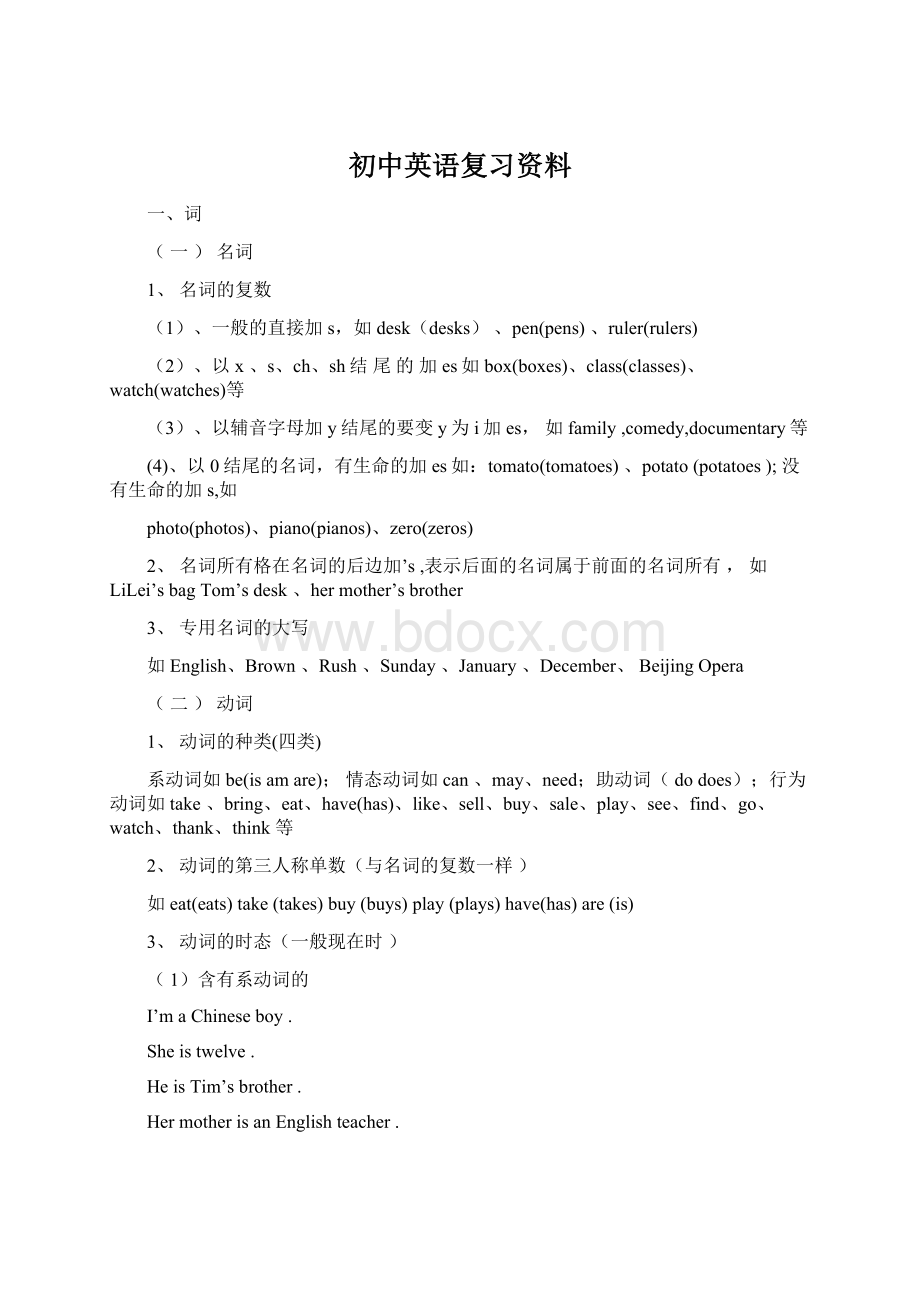初中英语复习资料.docx
《初中英语复习资料.docx》由会员分享,可在线阅读,更多相关《初中英语复习资料.docx(19页珍藏版)》请在冰豆网上搜索。

初中英语复习资料
一、词
(一)名词
1、名词的复数
(1)、一般的直接加s,如desk(desks)、pen(pens)、ruler(rulers)
(2)、以x、s、ch、sh结尾的加es如box(boxes)、class(classes)、watch(watches)等
(3)、以辅音字母加y结尾的要变y为i加es,如family,comedy,documentary等
(4)、以0结尾的名词,有生命的加es如:
tomato(tomatoes)、potato(potatoes);没有生命的加s,如
photo(photos)、piano(pianos)、zero(zeros)
2、名词所有格在名词的后边加’s,表示后面的名词属于前面的名词所有,如LiLei’sbagTom’sdesk、hermother’sbrother
3、专用名词的大写
如English、Brown、Rush、Sunday、January、December、BeijingOpera
(二)动词
1、动词的种类(四类)
系动词如be(isamare);情态动词如can、may、need;助动词(dodoes);行为动词如take、bring、eat、have(has)、like、sell、buy、sale、play、see、find、go、watch、thank、think等
2、动词的第三人称单数(与名词的复数一样)
如eat(eats)take(takes)buy(buys)play(plays)have(has)are(is)
3、动词的时态(一般现在时)
(1)含有系动词的
I’maChineseboy.
Sheistwelve.
HeisTim’sbrother.
HermotherisanEnglishteacher.
含有系动词的句子在变一般疑问句时只将“主语和系动词交换位置”,上面句子变成一般疑问句时分别为
AreyouaChineseboy?
(注意第一人称通常变为第二人称)
Isshetwelve?
IsheTim’sbrother?
IshermotheranEnglishteacher?
含有系动词的句子在变否定句时只须“在系动词的后边加上not”,前面的几个了陈述句变否定句分别为
I’mnotaChineseboy.
Sheisn’ttwelve.
HeisnotTim’sbtother.
Hermotherisn’tanEnglishteacher.
(2)含有情态动词的句子(can),
Shecanplaybasketball.
Hismother’scousincansingmanyEnglishsongs.
含有情态动词的句子在变一般疑问句时只须将“主语和情态动词交换位置”,上面两句变一般疑问句分别为
Cansheplaybasketball?
Canhismother’scousinsingmanyEnglishsongs?
含有情态动词的句子在变否定句时直接在情态动词的后边加上not,上面两个陈述句变否定句分别为
Shecannotplaybasketball.
Hismother’scousincannotsingmanyEnglishsongs.
(3)含有行为动词的句子
Wehavemanyfriends.
TheywatchTVat7intheevening.
Thestudentstaketheirbookstoschool.
Ihavelunchatschool.
Youhaveasister.
1含有行为动词的句子在变一般疑问句时要在原句子的前面加do.上面的句子变成一般疑问句分别为
Doyouhavemanyfriends?
DotheywatchTVat7intheevening?
Dothestudentstaketheirbookstoschool?
Doyouhavelunchatschool?
Doyouhaveasister?
2含有行为动词的句子在变否定句时只须在行为动词前加don’t.上述五个陈述句变否定句分别为
Wedon’thavemanyfriends.
Theydon’twatchTVat7intheevening.
Thestudentsdon’ttaketheirbookstoschool.
Idon’thavelunchatschool.
Youdon’thaveasister.
3含有行为动词的句子,当主语是第三人称单数时,行为动词要加s(或es)如:
Shehasaredpen.
Hehaseggsforbreakfast.
Hermotherbuysaskirtforher.
Shelikesthrillers.
MybrotherwatchesTVeveryevening.
Hewantstogotoamovie.
含有行为动词的句子,当主语是第三人称单数时,变一般疑问句要“在原句子的前面加上does,同时行为动词要还原”。
上面的句子变成一般疑问句分别为:
Doesshehavearedpen?
Doeshehaveeggsforbreakfast?
Doeshermotherbuyaskirtforher?
Doesshelikethrillers?
DoesyourbrotherwatchTVeveryevening?
Doeshewanttogotoamovie?
含有行为动词的句子,当主语是第三人称单数时,变否定句时“在行为动词前面加does’nt,同时原行为动词要还原”。
上面的句子变否定句分别为:
Shedoesn’thavearedpen.
Hedoesn’thaveeggsforbreakfast.
Hermotherdoesn’tbuyaskirtforher.
Shedoesn’tlikethrillers.
Mybrotherdoesn’twatchTVeveryevening.
Hedoesn’twanttogotoamovie.
(三)形容词
本册所学的形容词不多,注意拼法和反义词
big(small)long(short)sad(happy)boring(interesting\funny)excitingdifficult
relaxinggreathealthyold(new)successfulwhite(black)
(四)代词
1、人称代词和物主代词
人称代词
第一人称
第二人称
第三人称
单数
复数
单数
复数
单数
复数
主格
I
we
you
you
she\he\it
they
宾格
me
us
you
you
her\him\it
them
物主代词
my
our
your
your
her\his\its
their
2、指示代词:
this(these)that(those)
3、不定代词somesomeone
4、疑问代词whowhathowmuchhowold(疑问副词:
whenwhere)
5、反身代词yourself
(五)数量词
1、基数词onetwothreefourfivesixseveneightnineteneleventwelvethirteenfourteen
2、序数词firstsecondthirdfourthfifthsixthseventheighthninthtenth
(六)介词:
本册的介词较少,主要用在介词短语里面,如
on:
onsale(销售)\onweekends(在周末)\onApril8th,(在四月八日)\onthedesk(在桌子上)\onTV(在电视上)\
in:
inEnglish(用英语)\intheafternoon(在下午)\inthecase(在盒子里)\
T-shirtinred(红色T恤)\beinthemovie(出演这部电影)\inSeptember(在九月)
beinourschoolmusicfestival(参加我们学校的音乐节)
at:
callsb.at3356(拨打3356找某人)\atyourschool(在你们学校里)\atHuaxingClothesStore(在华兴服装店)\ataverygoodprice(以非常优惠的价格)\atsix(六点钟)
havealookat(看一看)
of:
asetof(一串…)\thephotoofyourfamily(你的全家照)\lotsof=alotof(许多)\
dateofbirth(birthday)(生日)
with:
withsb.(同某人一起)\begoodwith(和…相处得好)\helpsb.withsth.(帮助某人做某事)
for:
thanksfor=thankyoufor(谢谢某人的….)\bagforsports(运动包)\pantsfor$30(卖30元的裤子)\seeforyourself(亲自看看)\forgirls(对女孩子来说)\likesth.forlunch(喜欢吃……当作午餐)
about:
aboutChinesehistory(有关中国历史)
under:
underthedesk(在桌子下面)
(七)副词:
除疑问副词外,本册的副词有onlytooverywelloftenalsoreally
副词onlyoftenalsoreally等在句中的位置都是在行为动词前面或是系动词的后面。
注意几组词的区别:
1、too和also:
too一般放在句子的末尾,also在行为动词前面或是系动词的后面。
2、well和good:
两个词都有“好”的意思,但well是副词,而good是形容词,well修饰动词,放在动词的后面,good修饰名词,放在名词的前面。
如playbasketballwell
speakEnglishwellagoodstudentGoodmorning
(八)冠词:
只有不定冠词a(an)和定冠词the两个
1、不定冠词a和an:
a用在辅音前,如apenachair\anappleaneggan用在元音前。
anoldteacheranEnglishbookanactionmovie
注意辅音字母第一个音是元音的情况:
FHLMNSX这七个字母的第一个音是元音,在说一个以上字母时要用an,如an“F”(一个F)an“X”(一个X)。
同时注意字母U,它是元音字母,但它的第一个音是辅音,因此说一个U,应为a“U”。
2、定冠词the:
当一个名词第二次出现时前面用the。
注意在三餐饭(breakfastlunchdinner)前不用the,月份和星期前都不用the,体育活动的球类运动前面不用the。
如:
havedinner\inJanuary\December\Sunday\playbasketball
playtennis(volleyball\soccer\PingPong\chess\baseball)在乐器的前面要用定冠词the。
如:
playtheguitar(theviolin\thepiano\thedrum)
(九)连词:
本册所学连词有andbutorthen
and连接两个词或两个句子,表示前后的句子意思顺接。
如:
IlikethrillersandIlikeactionmovies.
but连接两个句子,表示后面意思转折。
如:
Helikestomatoesbutshedoesn’tlikebroccolisor表示选择关系。
如:
Canyouplaythepianoortheviolin?
then表示动作的先后顺序。
二、句子(句子的种类):
句子分为四种即陈述句、疑问句、祈使句和感叹句。
这里重点介绍疑问句和祈使句
(一)疑问句:
一般疑问句、特殊疑问句、选择疑问句、反意疑问句1、一般疑问句:
见前面的动词部分。
一般疑问句的回答用“yes”或“no”开头,用“yes”作肯定
回答时后面不能出现“not”,用“no”作否定回答时后面要出现“not”。
2、特殊疑问句:
其结构为“特殊疑问词+一般疑问句的结构”本册出现的特殊疑问句有
1MynameisJim.What’syourname?
HisnameisMarry.What’shisname?
HerfirstnameisBrow.Whatisherfirstname?
2Herbagisonthebed.Where’sherbag?
Theorangesareintheroom.Wherearetheoranges?
3Mytelephonenumberis2975.Whatisyourtelephonenumber?
4I’mfine.Howareyou?
Sheisfine.Howisshe?
5I’mfifteenyearsold.Howoldareyou?
6Thisskirtistwelvedollars.Howmuchisthisskirt?
Thesepantsare18dollars.Howmucharethesepants?
7HerbirthdayisSeptember23rd.Whenisherbirthday?
8Theappleisred.Whatcoloristheapple?
What’sthisinEnglish?
Howdoyouspellthisword?
Whatkindofmoviesdoyoulike?
(二)祈使句:
表示命令、请求。
本册所学的祈使句类型有
Spellit,please.
Pleasetakethesethingstoyoursister.
Let’splayping-pong.(tennis\basketball\volleyball)
Comeandbuyyourclothes.
HavealookatZigZag’sClothesStore.
三、情景会话:
本册出现的主要会话片段
1、--------Goodmorning!
(afternoon\evening)!
2、-----Nicetomeetyou!
--------Goodmorning!
(afternoon\evening)!
-----Nicetomeetyou!
3、--------Good-bye!
4、------Hello,Frank!
--------Good-bye!
(Bye-bye)------Hello,Eric!
5、--------Howareyou?
6、-----What’syourname?
--------Fine,thanks.Howareyou?
------MynameisJim.
-------I’mfine,too.(I’mOK.)8、------What’sthisinEnglish?
7、------What’sherfirst(last\family\given)name?
-------It’samap.
-------It’sJohn.--------Spellit,please.(Howdoyouspellit?
)--------M-A-P9、------What’sthisinEnglish?
10、-------Isthis(that)yourpencil?
------It’sanorange.------Yes,itis.it’smypencil.
------Whatcolorisit?
------(No,itisn’t.it’sherpencil.)
------It’sred.11、-----Whereismycomputergame?
12、--------DoyouhaveaTV?
-----It’sunderthebed.--------Yes,Ido.(No,Idon’t.)-----(Idon’tknow.)--------Doeshehaveatennistacket?
--------Yes,hedoes.(No,hedoesn’t.)
13、------Let’splayping-pong.14、-------Doyoulikesalad?
-----No,Idon’thaveaping-pongball.--------Yes,Ido.(No,Idon’t.)
----Well,letplayvolleyball.--------Helikesbananas.
----Thatsoundsgood.butshedoesn’tlikeicecream.
15、------HowmuchisthisT-shirt?
16、-----Whenisyourbirthday?
-----It’ssevendollars.------Mybirthdayis(on)November12th.
-----Howmucharetheseshorts?
------WhenisLiuPing’sbirthday?
-----Theyarethreedollars.------It’s(on)October15th.
17、-----CanIhelpyou?
------Howoldishe?
-----Yes,Iwant(tobuy)asweater.------He’sthirteen.
-----Whatcolordoyouwant?
18、----Doyouwanttogotoamovie?
-----Yellow.----Yes,Ido.
-----Hereyouare.----Whatkindofmoviesdoyoulike?
----Howmuchisit?
----Ilikeactionmoviesanddomentaries.
-----Elevendollars.19、---CanshespeakEnglish?
-----I’lltakeit.Thankyou.(thanks.)---Yes,shecan.(No,shecan’t.)
-----Youarewelcome.---Canyouspeakitwell?
---No,Ican’t.
20、----Whatclubdoyouwanttojoin?
21、--Whydoyouwanttojointheartclub?
-----Iwanttojointhebasketballclub.--BecauseIwanttolearnaboutart.
仁爱英语七年级上册语言知识点
Unit1Topic1词汇和重点句型:
1.Excuseme!
对不起,打扰了!
(用在事情发生之前)Sorry!
对不起(用在事情发生之后)
2.Nicetomeet/seeyou.=Gladtomeet/seeyou.很高兴见到你。
3.WelcometoChina/Fuzhou/Changle!
欢迎你到中国/福州/长乐来!
4.What'syourname?
你叫什么名字?
(常用于官方或者对小孩子说话)
MynameisMaria.=IamMaria.我叫Maria。
5.Standup.起立。
Sitdown.坐下。
6.Howdoyoudo?
Howdoyoudo?
你好!
你好!
(初次见面时打招呼使用)
7.Haveaniceday!
You,too.祝您一天愉快!
您也是!
8.Howareyou?
你身体好吗?
I'mfine/OK/well.Thanks.我很好,谢谢!
(可以缩略为:
Fine,thankyou.)
9.Seeyoulater!
=Seeyousoon!
等会儿见!
Seeyoutomorrow!
明天见!
Good-bye!
==Bye-bye!
=Bye!
再见!
10.ThisisMary.ThisisTom.这是Mary.这是Tom.(用于第三者介绍他人时)语言点:
1.Goodmorning.一般用于黎明时到中午十二点之前Goodafternoon.一般用于中午十二点以后到下午六点。
Goodevening.一般用于下午六点到晚上十点左右。
Goodnight.一般用于睡觉前,表示"晚安"。
Goodday.一般在白天问好时用,表示"日安",尤其是澳大利亚和美国英语中使用较多。
2.be的使用:
(记住口诀)
我用am,你用are;is用在他、她、它;单数is复数are;你、我、他们也用are.。
Topic2词汇和重点句型:
1.befrom=comefrom来自Whereareyoufrom?
=Wheredoyoucom